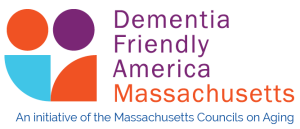Demographics, Programs and Services
In 2017, the University of Massachusetts at Boston Gerontology Institute, spearheaded by Dr. Elizabeth Dugan, published a report exploring the programs and services available in the Commonwealth for people with dementia and their communities. While the results of the study indicated that many regions throughout Massachusetts are considering or pursuing actions to become dementia-friendly, additional services are necessary to meet the needs of the growing dementia population. To adequately care for older adults with memory loss, the dementia-friendly initiative should be state-wide with each community tailoring their program to support the specific care necessities of their residents.
To best serve its residents, cities must assess the needs of the community and identify underserved populations. Vulnerable groups such as racial minorities or non-native English speakers not only face a general lack of resources but may not have access to culturally appropriate essential care. Learn more about the needs of older adults in your community.
Increasing general awareness of dementia is the first step in creating new dementia-friendly programs. The report indicated that most community stakeholders underestimated the pervasiveness of dementia in their area. Dementia education would benefit community members across all sectors. Healthcare professionals knowledgeable about dementia will provide better care. Caregivers with access to training and mentorship programs can be better prepared and informed about their responsibilities. Neighbors armed with knowledge about recognizing memory loss and communication tools can create a welcoming environment for an individual with dementia in public settings.
Using pre-existing systems and programs like the age-friendly movement integrates shared knowledge and resources to create a combined age- and dementia-friendly initiative.
Many programs and services qualify as both age- and dementia-friendly as demonstrated in the Integrated Age- and Dementia-Friendly Toolkit.
In addition to studying the changing demographics in the Commonwealth, Dugan considered the availability of different services and programs. Across the board, resources for people with dementia are scarce, and even in program-rich areas of Massachusetts, there is still a shortage of options. Dugan considered the following resources in her study:
Public and private-pay programs and services that directly serve the needs of dementia clients studied in this report include:
- Adult Day Health Services
- Residential services with special care units (Assisted Living, Nursing Homes)
- Support groups (caregivers, people with dementia)
- Memory Cafes
- Age-Friendly Programs
Organizations in the community encourage citizens to participate in local activities while governmental systems can ensure the wellbeing and safety of its residents.
- Dementia-Friendly Community efforts
- Council on Aging
- Age-Friendly
- Silver Alert
Dementia awareness through education and specialized training promotes empathy and informed engagement from community members and professionals.
- NICHE hospital (nursing education, consultation)
- Community Events
In summary, as adults age in Massachusetts, cities and towns must anticipate the inevitable demographic shift by establishing age- and dementia-friendly programs and services. Read the full report here.
